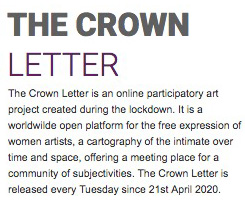STOP INVASION OF UKRAINE
APRIL 12 TO APRIL 19
Esther Shalev-Gerz

Aurelia Mihai
Liza Dimbleby

Nadia Lichtig

Taia Galagan- Gershuni

Manuela Morgaine
Tribute to Mantas K. (1977-2022) Mariupolis, Mantas Kvedaravicius, 2016.
Mantas Kvedaravicius Ukrainian director has just died in Mariupol with his camera in his hand, while shooting a documentary on the war. He was forty five years old. In 2016 he had already made this documentary MARIUPOLIS at the time of the Donbass war. He was an angel, and a committed poet, until the end, his camera in his hand, over there, testifying for all of us, until the end, over there, his camera in his hand, until the end.
Katja Stuke

A Tree in Slowjansk
(Google Street View 2019) Apr 11, 2022
Valeria Troubina

Ruth Maclennan

The railway line runs right through the centre of the town, making it easy for holidaymakers to arrive and depart. This is a hot summer day in 2012, in this sleepy town in Crimea. In 1944, the Crimean Tatars were rounded up, accused of collaborating with the German Nazi Occupiers, and forced into exile, in what is known as the Surgun (meaning Exile). They were sent to camps in the Soviet Republic of Uzbekistan by Stalin. Some of them would have left from here; half of them never arrived. It was years later before Crimean Tatars were exonerated and later still before they were allowed to return to live in Crimea, only to find their homes and villages destroyed and the Tatar names erased. In 2012, the Tatar Medjlis, its representative body, was thriving, able to negotiate with the Ukrainian government to assure the rights of Tatars and preserve their heritage and culture. We met with historians in Bakhchysarai where the Tatar archaeological site was being excavated and preserved. Robin made a radio broadcast about it and wrote this article. https://www.bbc.co.uk/news/magazine-19815852
In 2016, the Medjlis was banned by the Russian government.
